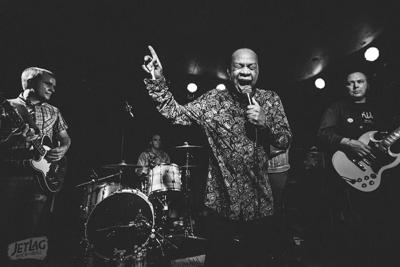
Derv Gordon
Go see Derv Gordon on Wednesday. Give a big ol’ middle finger to dynamic pricing schemes and myopic visions of music history and go see an artist who has mattered for six decades and counting without fitting into the square holes the C-suite has cut out for legacy artists. Go see a man who sang on records that capture singular moments in time while predicting decades of underground trends. Go see the singer of The Equals, one of the most dynamic bands to ever come out of the U.K. — ska-adjacent garage stompers who dabbled in psych and funk with energy, vitality and rebelliousness that foretold punk and New Wave as well as all their revivals and permutations. To top it all off, they effectively Trojan-horsed a perceptive social conscience into some of the most singable tunes of pop music’s imperial phase.
You might not know The Equals. Unusual for the back half of the 1960s, the original group was a multiracial unit including Derv and his guitarist brother Lincoln Gordon, guitarist and songwriter Eddy Grant, guitarist Pat Lloyd and drummer John Hall. Though this ensemble never toured the States, you could find their records sprinkled around the Midstate in dollar bins and storage-shed sales near military bases throughout the Aughts, a time when the death of vinyl meant childhood collections were being tossed to the curb. (Between the alleged death of vinyl and the format’s awkward rebirth, seemingly every secondhand shop from Clarksville to Oak Ridge was awash in European pressings of some wild pop music.) The Equals’ presence in the U.S. mostly consists of Nuggets-syle compilations and covers of songs like “Police on My Back” by bands like The Clash.
If The Equals have clearly influenced some important people, why are they noncanonical in terms of the American underground? You could chalk it up to the band’s willingness to slide between genre markers: Gordon’s voice could make every record a soul record, but the tunes range from highlife bops to full-fuzz psychedelia. Sure, the songs are thrillingly anti-establishment — “Bad Boy” and “Black Skinned Blue Eyed Boys” are classic two-finger salutes to the status quo — but don’t we expect that from our rock ’n’ rollers? They were a singles band in an album era, but The Equals were making music for the masses, and the 45-rpm platter is definitely the format of the people.
I don’t have all the receipts, but I’d wager that it comes down to corporate music not being able to handle treating Black rock musicians as, ahem, equals. Corporate America’s canonization of rock ’n’ roll seemingly only allows for one Black artist to be revered in each time- or style-based subgenre: Early rock has Little Richard, classic rock has Jimi, the punx get Bad Brains, ’80s metal gets Living Color and so on. It’s not fair, and it eschews contemporary successes and historical accuracy for storylines that reinforce a harmful hegemony. But it also puts The Equals in the company of some of the rock era’s greatest ensembles — The Isley Brothers, The Chambers Brothers, Frankie Beverly and Maze — and coolest deep-cut acts like Black Merda, Cymande and Death. It is a club whose artistic contributions to global culture far outstrip the acclaim they’ve been given.
So here’s your opportunity to help fix that historical wrong: Go see Derv Gordon alongside a slew of great rock bands from near and far (including Sydney, Australia’s Gee Tee and Nashville’s The Sleeveens, who are fronted by Irishman Stef Murphy). Dance your ass off, rock the fuck out and celebrate the fact that corporate monopolies and racist mentalities haven’t taken over every stage and stream in the music world. Remember that great pop music belongs to the people, and the people are ready to party, scalpers and suits be damned.





